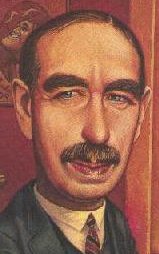

|
He lived life to the full, not only as an economist and statesman, but also as a journalist, art collector, bibliophile, and patron of the arts.
His criticism of the peace treaty of Versailles (1919) with Germany in The Economic Consequences of the Peace (1919) made him famous overnight and effectively undermined public support for the treaty.
During the crises of the 1920s he came increasingly to identify conservative economic policies as the cause of Britain’s economic problems. From this beginning, he developed a new theory of income determination, grounded in the concept of the ‘consumption function’, the ‘liquidity preference theory of interest’, and the inflexibility of money wages.
The unemployment crises inspired his two great works, A Treatise on Money , (1930) and the revolutionary General Theory of Employment, Interest and Money , (1936). He argued that full employment was not an automatic condition, expounded a new theory of the rate of interest, and set out the principles underlying the flows on income and expenditure, and fought the Treasury view that unemployment was incurable.
Unemployment, Keynes showed, was due to a deficiency in the demand for goods and services. Governments could, by adjusting their own spending, overcome that deficiency. Control of the money supply and interest rates could also influence investment. Economic cycles could be ameliorated by macro-economic fine-tuning. The scourge of unemployment could be eliminated through enlightened monetary and fiscal policies.
As well giving influential advice to the British Treasury, Keynes’s views on a planned economy influenced Roosevelt’s “New Deal” administration. He also played a central role in the Bretton Woods Conference of 1944 which created the International Monetary Fund and the International Bank for Reconstruction and Development.
His influence on economics was such that the thirty-year boom in Western industrial countries (1945-75) has been called the Age of Keynes.
extract from
 British economist, pioneer of the theory of full employment, and with many other interests from book collecting to probability theory.
British economist, pioneer of the theory of full employment, and with many other interests from book collecting to probability theory.
John Maynard Keynes is unquestionably the major figure in twentieth- century economics. His reputation does not rest solely on the General Theory of Employment, Interest and Money (1936), which initiated the so-called Keynesian Revolution, but also on his other writings, most notably A Treatise on Probability (1921) and A Treatise on Money (1930).
The Jobs Letter No.46
"Sixty Years of Citizen Keynes"

Top of Page
This Letter's Main Page
Stats |
Subscribe |
Index |
The Jobs Letter Home Page |
The Website Home Page
jobs.research@jobsletter.org.nz
The Jobs Research Trust -- a not-for-profit Charitable Trust
constituted in 1994
We publish The Jobs Letter